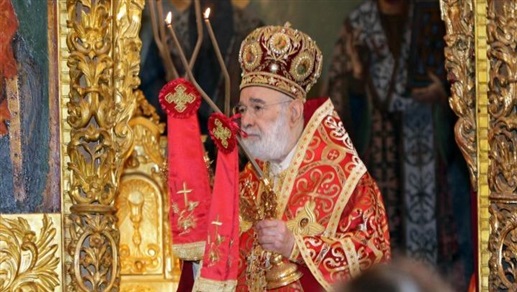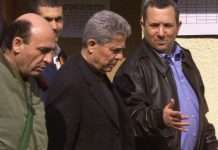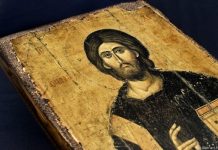Text of Bishop Aoudi’s sermon delivered today, October 1, 2023, during the Divine Mass that he presided over in St. George’s Cathedral
*Instead of going into details about the priorities of the future president, wouldn’t it be more effective to elect this president and let him work with his government?
NNA/LCCC/October 1, 2023
نص عظة المطران عودة التي ألقاها اليوم 01 تشرين الأول/2023، خلال القداس الإلهي الذي ترأسه في كاتدرائية القديس جاورجيوس
*عوض الاستفاضة بوضع الأولويات للرئيس العتيد أليس الأجدى انتخاب هذا الرئيس وتركه يعمل مع حكومته؟
وطنية/01 تشرين الأول/2023
ترأس متروبوليت بيروت وتوابعها للروم الأرثوذكس المطران الياس عودة خدمة القداس الإلهي في كاتدرائية القديس جاورجيوس. والقى عظة قال فيها: “يظهر الإنجيلي لوقا، في إنجيل اليوم، قاعدة أساسية على الإنسان أن يتبناها لكي يبني على أساسها علاقته بأخيه الإنسان، على مثال العلاقة التي أرساها الله معنا نحن خليقته. تختصر هذه القاعدة كل فضيلة ووصية، كل عمل ورأي صالح. إنها المحبة المجانية تجاه الجميع، التي لا تطلب أي مقابل: “فإنكم إن أحببتم الذين يحبونكم فأية منة لكم؟ فإن الخطأة أيضا يحبون الذين يحبونهم”.
أضاف: “الإنسان الذي يحب أخاه يظهر محبته تجاهه عبر رحمته ومغفرته له، كما فعل الرب يسوع عندما أحبنا حتى الصليب، باذلا نفسه من أجل خلاصنا. وقد أوصانا قائلا: «كونوا رحماء كما أن أباكم هو رحيم». يقول الرسول يوحنا: «هو كفارة عن خطايانا وليس عن خطايانا فقط، بل عن خطايا العالم كله أيضا» (1يو 2: 2). قد يتساءل البعض كيف نكون رحماء. لقد قدم الرب يسوع جوابا عن هذا التساؤل بقوله: «أحبوا أعداءكم وأحسنوا وأقرضوا غير مؤملين شيئا فيكون أجركم كثيرا وتكونوا بني العلي، فإنه منعم على غير الشاكرين والأشرار» (لو 6: 35)، ويضيف: «لا تدينوا فلا تدانوا، لا تقضوا على أحد فلا يقضى عليكم، اغفروا يغفر لكم، أعطوا تعطوا… لأنه بالكيل الذي تكيلون به يكال لكم» (لو 6: 37-38). رحمة تتجلى قبل أي شيء في المغفرة: «لا تدينوا فلا تدانوا…». لم يقصد الرب أن يقلب موازين العدالة البشرية، إنما يذكر تلاميذه بأن عليهم التوقف عن إصدار الأحكام والإدانات، والنظر إلى الذات من أجل إدراك الخطايا الذاتية والتخلص منها”.
وتابع: “المغفرة هي العمود الفقري الذي تستند عليه كل حياة الجماعة المسيحية، لأن فيها تتجلى مجانية المحبة التي أحبنا بها الله أولا. لماذا على المسيحي أن يغفر؟ لأنه قد غفر له. ألم يعلمنا الرب في الصلاة الربانية أن نقول: «واترك (أغفر) لنا ما علينا كما نترك (نغفر) نحن لمن لنا عليه»؟ لقد علمنا الرب أن نغفر للآخر، ثم وضع هذه المغفرة شرطا لكي نحظى نحن بدورنا بمغفرته، وطبعا ما من أحد لا يحتاج إلى مغفرة الله. لهذا، علينا أن نحيا المغفرة دوما، حتى نحصل عليها دوما. هذا يعني أن نغفر الإساءة، أن نغفر أمورا كثيرة تزعجنا، لأنه قد غفر لنا الكثير من الإساءات والخطايا. فإذا كان الله خالقنا قد غفر لنا، فلماذا لا نغفر بدورنا للآخرين؟ ركيزة الغفران هذه تبين لنا مجانية محبة الله الذي أحبنا أولا وبذل نفسه عنا ليخلصنا”.
وقال: “إن الحكم على الآخر الذي يخطئ، وإدانته، هو عمل خاطئ، ليس لأننا لا نريد الإقرار بالخطيئة، بل لأن إدانة الخاطئ تقطع رباط الأخوة معه وتتخطى رحمة الله الذي لا يتخلى عن أحد من أبنائه. لا سلطان لنا لندين أخانا الذي يخطئ، ولسنا في مرتبة أعلى منه، بل لدينا واجب استعادته لكرامة بنوته للآب، وواجب اصطحابه في مسيرة توبته، مع إدانتنا لخطيئته، وليس له شخصيا، إذ إن «الجميع أخطأوا وأعوزهم مجد الله» (رو 3: 23). من واجب كل منا إظهار الخطايا والسيئات وإدانتها، وفي الوقت نفسه مساعدة الخاطئ على التوبة”.
أضاف: “إن كانت المغفرة الركيزة الأولى، فالعطاء هو الركيزة الثانية. يقول لنا الرب: «أعطوا تعطوا… لأنه بالكيل الذي به تكيلون يكال لكم» (لو 6: 38). لقد أنعم الله علينا بما هو أكثر بكثير مما نستحق، لكنه سيكون أكثر عطاء مع من كانوا أسخياء هنا على هذه الأرض. لم يتكلم الرب يسوع على ما سيحدث مع الذين لا يعطون، إنما أعطانا تشبيه «الكيل» تحذيرا لنا. فمقدار المحبة التي نمنحها، يقرر مقياس الكيل الذي سيكال به لنا، لهذا قال لنا: «كما تريدون أن يفعل الناس بكم، كذلك افعلوا أنتم بهم» (لو 6: 31). كلام الرب يمتاز بمنطق متناسق علينا الانتباه له، إذ بالمقدار ذاته الذي يمنحنا إياه الله، علينا بدورنا أن نمنح الآخر، وبالمقدار نفسه الذي نمنحه للآخر سيمنحنا الله”.
وتابع: “وصية المحبة هي أعظم الوصايا التي أعطانا إياها الرب يسوع (متى 22: 37-39). «فليحب بعضنا بعضا لأن المحبة من الله وكل محب مولود لله وعارف بالله. من لا يحب لم يعرف الله لأن الله محبة» (1يو4: 7 – 8). المحبة تحمل الرحمة، وهي الدرب الوحيد الذي علينا سلوكه. نحن بحاجة لأن نكون أكثر رحمة، وألا نتكلم بالسوء على الآخرين، وألا نحكم عليهم أو نحسدهم أو نذلهم. علينا أن نغفر ونكون رحماء ونعيش حياتنا بالمحبة التي لا تسمح للإنسان المسيحي أن يفقد الهوية التي تسلمها من الرب، بل تجعله يدرك أنه ابن للآب. وفي المحبة تتجلى كل من الرحمة والعطاء والمغفرة. هكذا، يتسع القلب ويتألق بالمحبة. الأنانية والغضب يجعلان القلب يتقلص ويتصلب كالحجر. فهل نريد قلبا حجريا، أو قلبا مليئا بالمحبة؟ إن كنا نفضل قلبا عابقا بالمحبة علينا أن نكون رحماء”.
وقال: “في حديثنا عن الرحمة والمحبة، يظهر أمام أعيننا كم يفتقر بلدنا إلى هذين العنصرين المخلصين. الرحمة غائبة عند الجميع، عند المسؤولين تجاه الشعب، وعند أعضاء الشعب فيما بينهم. هذا يدل على أن المحبة انقرضت، وحلت مكانها المصالح الشخصية الضيقة التي أصبحت الركيزة الأولى والوحيدة لدى بعض السياسيين وأصحاب المصارف والتجار والمحتكرين والموظفين والأطباء وغيرهم ممن يقدمون مصالحهم بأنانية وجشع، غير آبهين بمعاناة إخوتهم”.
أضاف: “مؤسف أيضا ما نسمعه على لسان الزعماء والمسؤولين الذين يتهم واحدهم الآخر ويتبادلون اللوم والتعيير والإدانة، مدفوعين بغايات ومصالح لا تفيد البلد ولا تخرجه من الهوة الواقع فيها. كل طرف يلقي بتهمة تعطيل انتخاب رئيس على عاتق الآخرين. قد يكون الأمر صحيحا ولكن من منهم يسهل الأمر، تاركا مصالحه وشروطه وارتباطاته، داعيا فقط إلى تطبيق الدستور وانتخاب رئيس يكون قائدا ملهما وملهما، صاحب رسالة إصلاحية، لا زعيما يتبعه الناس ظالما كان أو مظلوما؟ الأخلاق، الإنسانية، المحبة، التضحية، العطاء، هذه تنقصنا في هذا البلد لكي نتمكن من النهوض. الدول المهتمة بلبنان منزعجة من تصرف كافة الأطراف، وتتساءل عن جدوى استمرار اهتمامها بلبنان، فيما يتمادى المسؤولون في عدم تحمل المسؤولية، وفي إطالة عمر الفراغ. وعوض الإستفاضة في وضع الخطط والبرامج والأولويات للرئيس العتيد، أليس أجدى للبلد أن ينتخبوا هذا الرئيس ويتركوه يعمل مع حكومته؟”
وتابع: “بلدنا بحاجة إلى سلطة تعالج كافة المشاكل التي تعترضه وتثقل كاهل أبنائه، وكلما طال المأزق كلما فرغ لبنان من أبنائه الذين يهاجرونه سعيا وراء حياة كريمة، فيبرعون ويبدعون، وأمين معلوف خير مثال يفخر به لبنان، فيما تزداد موجات النزوح إلى لبنان مع ما تسببه من مشاكل وأعباء”.
وختم: “دعوتنا اليوم أن نرحم ونحب لنكون أبناء الله حقا، فيتمجد بسببنا اسمه القدوس، ونصبح من أبناء الملكوت”.
Text of Bishop Aoudi’s sermon delivered today, October 1, 2023, during the Divine Mass that he presided over in St. George’s Cathedral
Instead of going into details about the priorities of the future president, wouldn’t it be more effective to elect this president and let him work with his government?
NNA/LCCC/Google Translation/October 1, 2023
The Greek Orthodox Metropolitan of Beirut and its dependencies, Bishop Elias Aoudi, presided over the Divine Liturgy service in St. George’s Cathedral. He delivered a sermon in which he said: “The Evangelist Luke shows, in today’s Gospel, a basic rule that man must adopt in order to build his relationship with his fellow man, on the example of the relationship that God has established with us, his creation. This rule summarizes every virtue and commandment, every good deed and opinion. It is free love towards everyone, which does not ask for anything in return: “For if you love those who love you, what credit do you have? For sinners also love those who love them.”
He added: “A person who loves his brother shows his love towards him through his mercy and forgiveness towards him, as the Lord Jesus did when he loved us to the cross, laying down himself for our salvation. He commanded us, saying: “Be merciful, just as your Father is merciful.” The Apostle John says: “He is Atonement for our sins, and not for our sins only, but also for the sins of the whole world” (1 John 2:2). Some may ask how we can be merciful. The Lord Jesus provided an answer to this question by saying: “Love your enemies, and do good, and lend, expecting nothing, and your reward will be great.” And you will be children of the Most High, for He is gracious to the unthankful and the wicked” (Luke 6:35), and adds: “Do not judge, and you will not be judged. Do not condemn anyone, and you will not be judged. Forgive, and you will be forgiven. Give, and it will be given to you… For with the measure you use, it will be measured back to you.” » (Luke 6: 37-38). Mercy is revealed above all in forgiveness: “Do not judge, and you will not be judged…” The Lord did not intend to overturn the scales of human justice, but rather reminded his disciples that they should stop issuing judgments and condemnations, and look to Self in order to realize and get rid of one’s own sins.
He continued: “Forgiveness is the backbone on which all the life of the Christian community is based, because in it the free love with which God first loved us is revealed. Why should a Christian forgive? Because he has been forgiven. Didn’t the Lord teach us in the Lord’s Prayer to say: “And let (forgive) “We have what we owe, just as we leave (forgive) those who owe us”? The Lord taught us to forgive the other, and then he set this forgiveness as a condition so that we in turn obtain His forgiveness, and of course there is no one who does not need God’s forgiveness. Therefore, we must always live forgiveness. , so that we always obtain it. This means to forgive offenses, to forgive many things that bother us, because many offenses and sins have been forgiven us. If God, our Creator, has forgiven us, then why do we not in turn forgive others? This pillar of forgiveness shows us the freeness of God’s love, which He first loved us and gave himself for us to save us.”
He said: “Judging and condemning another who sins is a wrong act, not because we do not want to acknowledge the sin, but because condemning the sinner breaks the bond of brotherhood with him and bypasses the mercy of God who does not abandon any of his children. We have no authority to condemn our brother who sins. We are not in a higher position than him, but rather we have a duty to restore him to the dignity of his sonship to the Father, and a duty to accompany him on the path of his repentance, while condemning his sin, and not to him personally, since “all have sinned and fall short of the glory of God” (Romans 3:23). It is the duty of each of us to expose sins. and condemning evil deeds, and at the same time helping the sinner to repent.”
He added: “If forgiveness is the first pillar, then giving is the second pillar. The Lord tells us: ‘Give, and it will be given to you… For with the measure you use, it will be measured back to you’” (Luke 6:38). God has blessed us with much more than we deserve. But He will be more generous to those who were generous here on this earth. The Lord Jesus did not speak about what would happen to those who do not give, but rather He gave us the metaphor of “measure” as a warning to us. The amount of love that we give determines the measure of the measure with which He will measure to us, that is why He told us “As you would have people do to you, so do you to them” (Luke 6:31). The Lord’s words are characterized by a consistent logic that we must pay attention to, because with the same amount that God gives to us, we must in turn give to others, and with the same amount that we give to others, He will give to us. God”.
He continued: “The commandment to love is the greatest of the commandments that the Lord Jesus gave us (Matthew 22: 37-39). “Let us love one another, for love is from God, and every lover is born of God and knows God. He who does not love does not know God, because God is love” (1 John 4: 7 – 8). Love brings mercy, and it is the only path we must take. We need to be more merciful, not to speak ill of others, and not to judge them, envy them, or humiliate them. We must forgive, be merciful, and live our lives with the love that does not allow a Christian person To lose the identity that he received from the Lord, but rather to make him realize that he is a son of the Father. In love, mercy, giving, and forgiveness are manifested. Thus, the heart expands and shines with love. Selfishness and anger make the heart shrink and harden like stone. Do we want a heart of stone, or a heart full of love? We would rather have a heart full of love than be merciful.”
He said: “In our talk about mercy and love, it appears before our eyes how much our country lacks these two sincere elements. Mercy is absent from everyone, from officials towards the people, and from members of the people among themselves. This indicates that love has become extinct, and has been replaced by narrow personal interests that have become The first and only pillar of some politicians, bankers, merchants, monopolists, employees, doctors and others who selfishly and greedily advance their interests, not caring about the suffering of their brothers.”
He added: “It is also unfortunate what we hear from leaders and officials who accuse each other and exchange blame, reproach and condemnation, driven by goals and interests that do not benefit the country and do not get it out of the abyss it is in. Each party places the blame of obstructing the election of a president on the others. It may be true, but who Some of them facilitate the matter, abandoning their interests, conditions, and connections, calling only for the implementation of the constitution and the election of a president who will be an inspiring and inspirational leader, with a message of reform, and not a leader who people follow, whether he is unjust or unjust? Morals, humanity, love, sacrifice, giving, these are what we lack in this country in order to We can rise. Countries interested in Lebanon are disturbed by the behavior of all parties, and are wondering about the feasibility of continuing their interest in Lebanon, while officials continue not to bear responsibility and prolong the life of the vacuum. Instead of elaborating on setting plans, programs and priorities for the future president, would it not be more beneficial for the country to elect this president? And let him work with his government?
He continued: “Our country needs an authority that addresses all the problems facing it and burdening its people, and the longer the impasse lasts, the more Lebanon will be emptied of its people who emigrate to it in pursuit of a decent life. They excel and innovate, and Amin Maalouf is the best example of which Lebanon is proud, while the waves of displacement to Lebanon increase with what… It causes problems and burdens.”
He concluded: “Our call today is to have mercy and love, so that we may truly be children of God, so that His Holy Name will be glorified because of us, and we will become children of the Kingdom.”






















